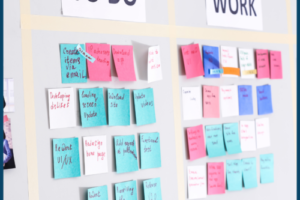
Could you live without a phone for 18 days? Here are 5 tactics to help you lessen your phone’s hold on your life
Could you go 18 days without your phone? I mean not turning it on at all: no texts, browsing, talking, emailing, games, apps, etc.
You may feel like you have to be connected at all times. You have to respond to every text, email, or call the moment you receive it, regardless of the topic, time of day, or what you’re doing.
There are reasons why you may feel this way: fear of missing out, expectations of others, boredom, etc.
Yet, the phone itself isn’t the issue. The problem is when you’re tethered to your phone at the expense of other activities. You’re less productive because every time you get into your flow, another sound pulls you back to your phone. You aren’t ever truly on vacation because you respond to work calls, emails, and texts while you’re away. Multi-tasking leads to misinformation and missed information. It’s more difficult to relax because you can easily respond to any thought that enters your head. I could go on, but I think you get the idea.
The truth is that you can live a full life without being completely attached to your phone. I just did it myself.
I was on an international vacation for 18 days. I could have paid $10 per 24-hour period in which I used my phone. However, I’m cheap. Plus, I knew it’d be harder to BE on vacation if I had easy access to my phone.
I’d planned for this. I told current clients that I wouldn’t be checking messages. I gave extra duties to my virtual assistant. I told friends and family that I could be contacted via email, since I was taking my tablet. I also gave family the dates and hotels as another way to be reached.
Now I know you’re thinking, “Ah, but she took her tablet!”
I briefly checked email every few days. I only responded to one work-related email. It was time-sensitive and the person didn’t know I was away. I didn’t log in to LinkedIn. I browsed Facebook even less frequently than email. I skipped all business-related posts.
I turned off my phone the evening of May 17th and didn’t turn it back on until the evening of June 5th. I didn’t suffer from withdrawal. The world didn’t end.
Instead, I had a wonderful, relaxing, and rejuvenating vacation!
Now you may be thinking, “That’s great, Janice, but what’s the point? After all, you can’t really think I’ll turn off my phone for 18 days!”
It’s this: when you’re always connected, it impacts your ability to get other important things done. Screen-time also affects your ability to get to sleep and you’re more susceptible to anxious thoughts.
Example: A medical crisis has occurred. In addition to your ongoing professional and personal responsibilities, you need to schedule medical appointments and learn more about the diagnosis. Depending on the situation, you may also have friends calling to ask how you’re doing.
If you look at your phone every time it sounds, you’ll have trouble carrying on a conversation, making an informed decision, gathering information, etc.
Let me introduce you to a concept I work on with clients: setting realistic boundaries.
Establishing parameters gives you room to breathe!
Here are some ideas to help you work with your phone rather than it working against you:
- Remove apps that split your focus. I’m specifically thinking of games, but there could be others. I had a client who spent lots of time browsing on Amazon, to the detriment of activities. He uninstalled the app. Yes, he can use the web browser or reinstall the app, but that extra step reminds him why he eliminated it.
- Install apps that increase your focus. There are so many choices! Here are just a couple:
- Use mindfulness apps such as Calm, Headspace, or Breathe to help develop intentionality and focus.
- Apps like Stay Focused allow you to set time boundaries on which sites and apps you can access during certain hours.
- Differentiate. I’m not an advocate of having two cell phones. However, there are other ways to separate your personal and professional life on a single phone.
- I’ve discovered the beauty of having different phone numbers on the same phone. I’ve had the same business phone number since 2002. While it started as a landline, eventually I wanted to delete the landline, but keep the same number. I couldn’t port the number through Google Voice without jumping through hoops. A client told me about Sideline. I easily ported the landline number to my cell phone. For $10 a month, I have a completely separate ring and text notification tones for my work number. Even better, I can text via my laptop!
- I have a specific ring tone for family members. With aging parents, this is important because I always want to answer when they call. Otherwise, I let personal calls go to voicemail during business hours.
- As mentioned above, I have completely different sounds for calls and texts on my work line.
- Select the best settings for your activities. I have my work number forwarded to voicemail. This doesn’t affect my personal number, even though they are on the same phone. Silencing your phone while you’re working on a task is also extremely useful.
- Create other defaults. Since the phone is so handy, it’s easy to be on it without even thinking. It takes intention and a little planning to form an alternative habit. For example, I carry a small magazine in my purse so I can read it when I’m waiting rather then taking out my phone. Maybe you could replace looking at the phone when it sounds with taking a sip of water or closing your eyes and taking a deep, cleansing breath.
When you started reading this post, you may have thought that I would advocate for you not turning on your phone for 18 days. I realize that the idea may have had you trembling with anxiety. I also know that it is unrealistic for some.
That being said, I do feel that being so attached to the phone often leads to decreased productivity and increased worry.
What’s one very small action you can take today to decrease your attachment to your phone? Type your “one very small action” in the comments. This will make you more likely to take action!



